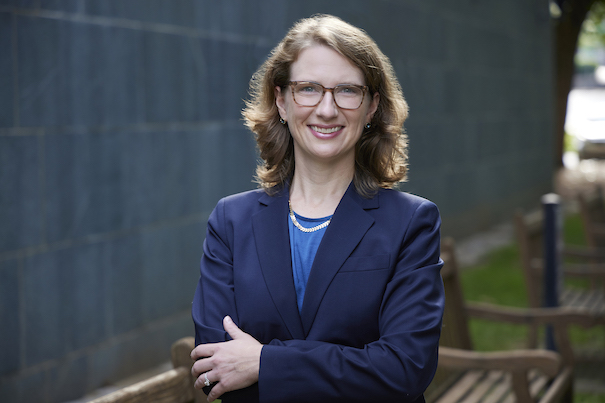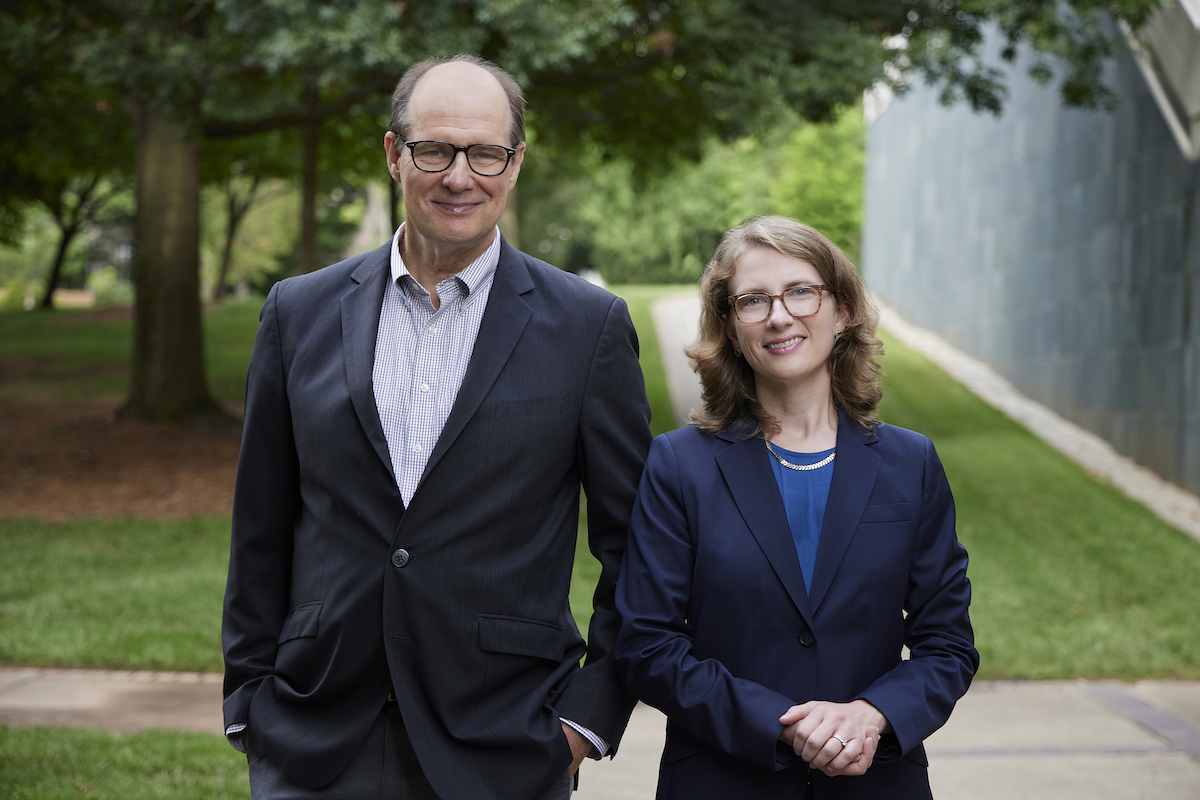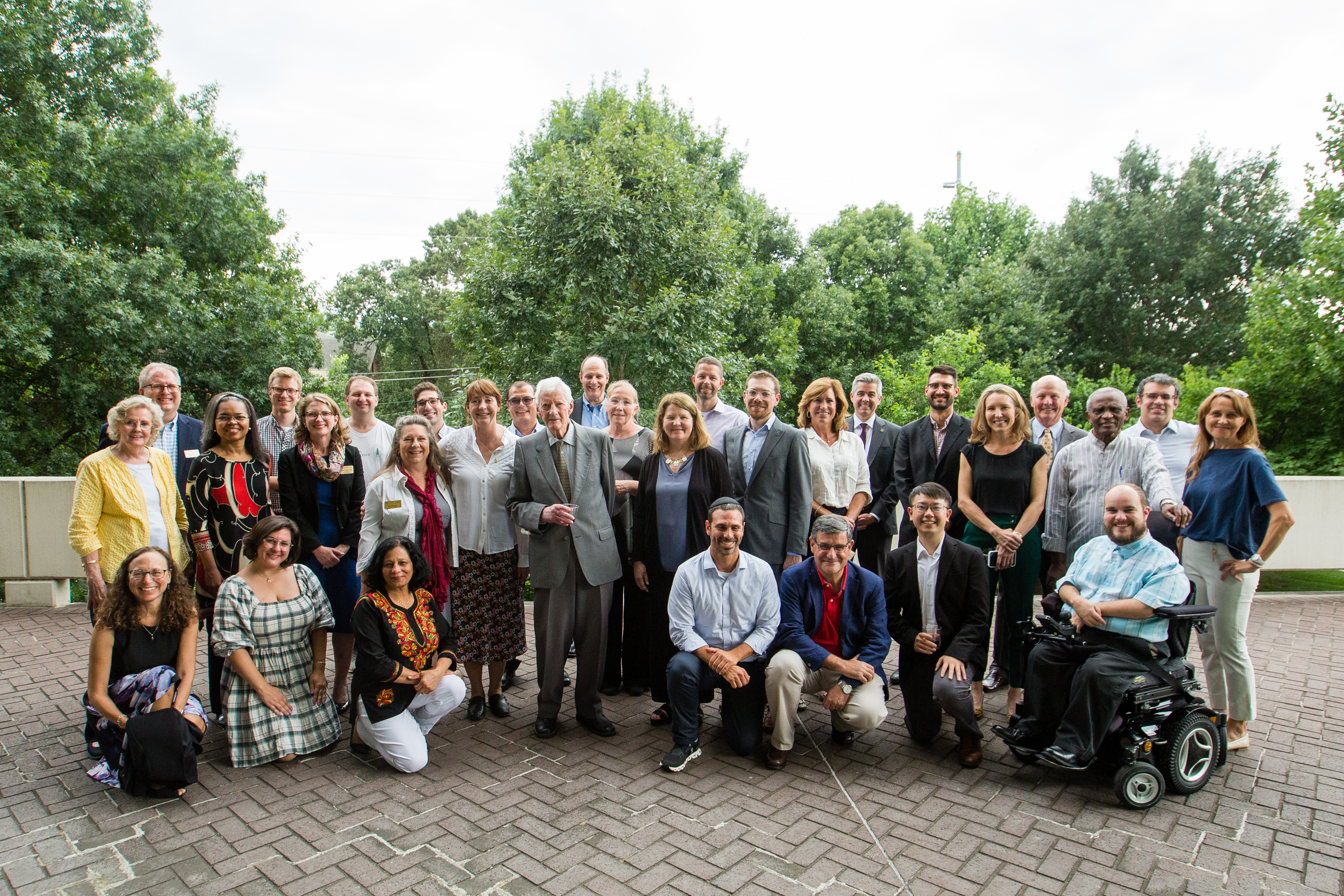CSLR Interview with Whittney Barth
By CSLR | Emory Law | Sep 6, 2022 7:09:00 AM

On August 1st, the Center for the Study of Law and Religion welcomed our new executive director, Whittney Barth, to Emory's campus. In her new role, Barth will manage CSLR daily operations; recruit and lead staff, post-doctoral fellows, visiting scholars, and student fellows; create and support research projects; build new alliances across campus; and organize events, including celebration of the Center’s fortieth anniversary in the 2022-23 academic year.
Barth joins CSLR after nearly three years as a litigator with a nationally-recognized plaintiffs’ firm Sanford Heisler Sharp where she worked primarily on employment discrimination matters. She is a graduate of the University of Chicago Law School and served for nearly five years as the Assistant Director of the Pluralism Project at Harvard University, where she also received her Master of Divinity.
We sat down with Whittney to learn more about her path to Emory and plans for the future.
Welcome to Atlanta! Your career includes an impressive array of graduate training, university project management, and legal practice. What made CSLR the right place for the next phase of your career?
Thank you! I’m delighted to be here and grateful for the warm welcome I’ve received.
There were a few things that convinced me that CSLR was the right place for me. I think of the experiences that you highlighted in your question as related yet distinct threads in my professional trajectory. I see CSLR as a place where I have an opportunity to intentionally weave those threads together to find creative approaches to my new role and to thinking about the Center’s future.
The Center is committed to examining, and fostering a deeper understanding of, the many ways in which law and religion can and do shape our public and private lives. That focus resonated with my own enduring intellectual and civic interests. Further, since its inception in the 1980s, CSLR has fostered interdisciplinary conversations and being able to advance that aspect of the Center’s mission into the future was particularly exciting to me.
Finally, with each conversation during the interview process, I became even more excited to be part of such an inviting and intellectually curious community of scholars and practitioners. I’m thrilled that I now have an opportunity to be a part of welcoming others into that space.

Photo: CSLR Faculty Director John Witte, Jr. and new CSLR Executive Director Whittney Barth
After graduating from Harvard Divinity School, you served for nearly five years as the Assistant Director of the Pluralism Project at Harvard University. What lessons did you take away from your time there?
I learned so much during my time at the Pluralism Project. First and foremost, I learned to be thankful for amazing colleagues and mentors. Dr. Diana Eck, founder and director of the Pluralism Project, and Ellie Pierce, the Project’s long-time research director, are at the top of my list of people with whom I am grateful to have worked, as was the late Brendan Randall, with whom I collaborated during my time at the Project.
In a similar vein, I realized how fulfilling I personally find working and collaborating with students. I’m thrilled to be at Emory where I hope to find ways that I and the Center can support existing opportunities for students to be engaged in the development of scholarship and to create new ones.
In 2019, you earned your JD from the University of Chicago. What inspired your decision to study law? How did your time there influence your understanding of the intersections of law and religion?
My most immediate inspiration to study law came while at the Pluralism Project, where I encountered the work of civil rights attorneys and organizations working on behalf of Muslim, Hindu, and Sikh communities in a post-9/11 world. It was also during this time that worshippers at the Sikh Temple in Oak Creek, Wisconsin and Bible study attendees at Mother Emanuel AME Church in Charleston, South Carolina, were attacked and killed by men motivated by hateful ideologies. These horrific events galvanized my commitment to finding ways that I could work on behalf of people who are targeted because of who they are and to protect basic human rights where they are threatened.
During law school, experiences both outside and inside the classroom informed my understanding of the intersection of law and religion. I interned with the ACLU’s Program on Freedom of Religion and Belief as well as with Muslim Advocates, experiences that offered me a window into how pressing issues facing religious communities and individuals arise out of everyday encounters and are intertwined with many areas of the law. I also had the privilege of working with a small group of law school colleagues to research current practices for and challenges to hate crime reporting. Our efforts culminated in the writing of a report that put forth potential improvements to those approaches. This, along with the writing of my Comment on hate speech for the Chicago Journal of International Law, provided me with opportunities to consider how legal regimes account for the experiences of religious and racial minorities. Finally, during my last year at Chicago, I was fortunate to be part of a seminar on Canonical Ideas in American Legal Thought where I had the chance to develop my research interests in the formation of the ministerial exception within employment law.
What are three books, scholars, or traditions that have shaped your intellectual development?
This was a challenging question for me to answer because it got me thinking about the degrees to which I’ve been shaped by a host of scholars, writings, and traditions. It is difficult for me to pick three and hold them up as definitive; I know I’ll probably wake up in the middle of the night tonight (or six months from now) thinking, “why didn’t I pick…!” With that caveat, my intellectual development has been shaped by the writings of Dorothy Day, Paul Tillich, and Robert Cover.
Who are some of the people who have most influenced your life and vocational choices?
In a 2009 chapter, philosopher Avishai Margalit describes “senses of influence,” noting that influence “takes many forms,” each with “subtle nuances.” He writes that “[i]mpact can be used to suggest a direct and strong influence.” I’ll start there.
Years ago, I participated in a summer program in Columbus, Ohio that provided Lutheran high school students with an opportunity to explore theological education. While participating in that program, I attended a talk given by Alfred Tibor, an internationally known sculptor and Holocaust survivor. Mr. Tibor spoke to our group on the lawn outside of Trinity Lutheran Seminary where one of his pieces is installed. [You can read more about Mr. Tibor and see that sculpture, “Promise for Life,” here.] After telling us about his life and his work, he exhorted us to be the generation that finally stood up to hate through an active love of our neighbor. Mr. Tibor and his message impacted my decision to become involved in interfaith initiatives and to pursue the study of comparative religion, with the aim of working with college students to help them find meaning and work together to build a better world for all.
In terms of influence in a molding sense, both of my parents have had a profound influence on my life, instilling in me through their examples the importance of hard work, of caring for each other, and of treating people fairly. My spouse is someone whose impact on my vocational trajectory has been transformational, as he is a constant source of encouragement and a relentless thought partner.
I’ve also been fortunate over the years to be influenced in a number of different ways by great teachers, inside and outside the classroom, at each of my alma maters.
Can you tell us about your experience as a practicing lawyer? How does this professional experience differ, enhance, or inform the academic study of law?
The academic study of law can be a descriptive—what is happening—and sometimes normative—what should happen—exercise. My experience representing clients in employment discrimination and in sexual violence civil litigation underscore for me that this exercise does not happen in a vacuum. Both the promise and enforcement of law can have a very real, tangible impact on people’s lives. When laws that are meant to protect from harm or to provide a remedy once someone has been wronged are enforced, it can be a beacon of hope in what are often some of the darkest moments of a person’s life. At the same time, I also saw where law often falls short of its anticipated purpose or does not fully account for the reality of individual experiences. I am grateful to the senior attorneys with whom I worked closely at the firm who never shied away from reflecting on these types of issues and related questions while encouraging others to do the same.

Photo: The CSLR Community celebrates Professor Johan D. van der Vyver's
recent gift to the CSLR on August 16, 2022
You're joining CSLR on the eve of its fortieth anniversary. From your perspective, why is the study of law and religion important today? What are some of the challenges we can expect to face in the next forty years?
I think the study of law and religion is important today in no small part for the reasons it was important two generations ago: Both are formidable forces that have influence in and over people’s lives, often in profound ways. Over the next forty years, I suspect we will encounter new challenges in the law and religion space that pertain to the regulation of technological advances and environmental crisis, both of which are quickly pushing us to new frontiers in our thinking about humanity and the rest of the world of which we are a part and are building. I also think we’ll see some enduring challenges take new or different forms, challenges such as what are the limits of rights and what should the law require when the exercise of different rights come into conflict, competition, or conversation. I anticipate the complicated histories of law, religion, and race will also be sites for further examination.

